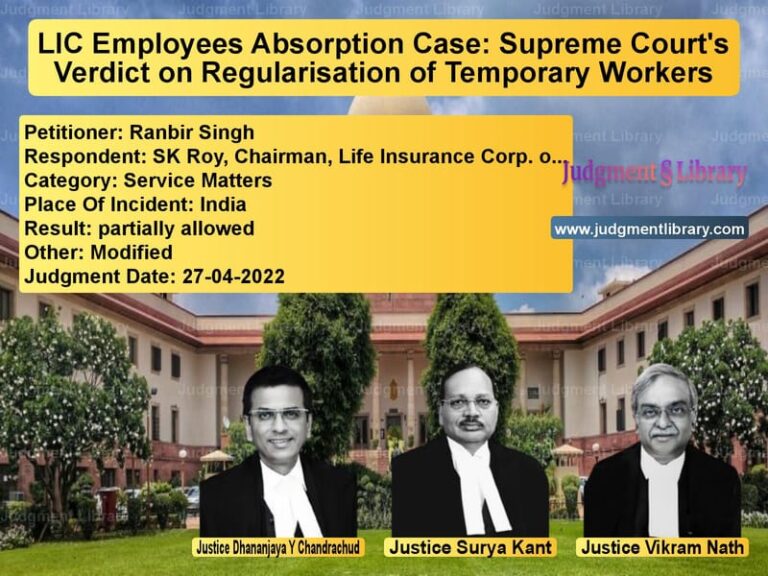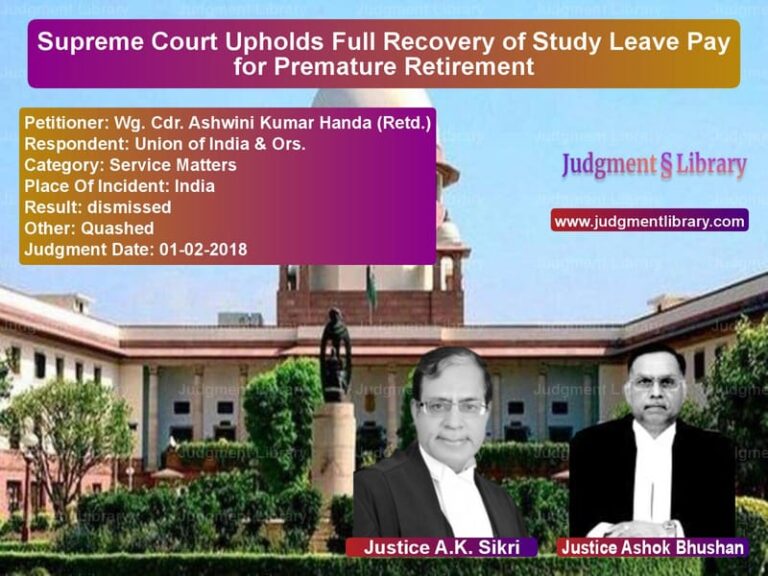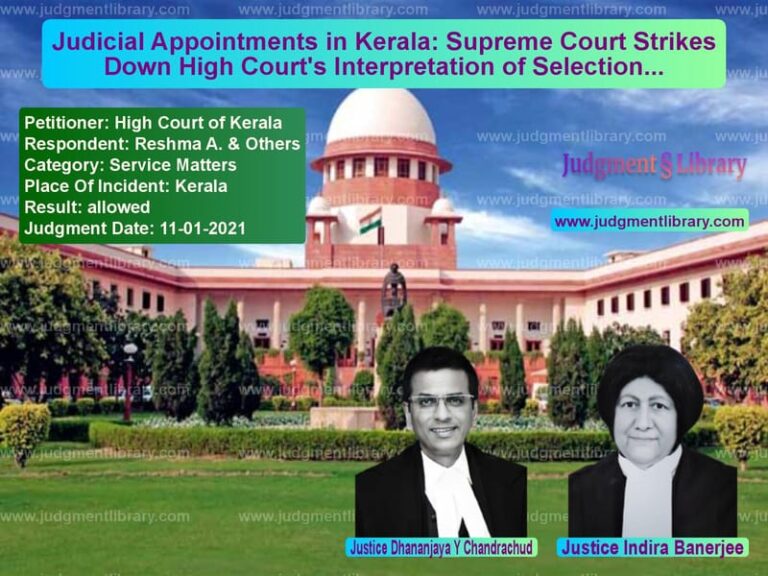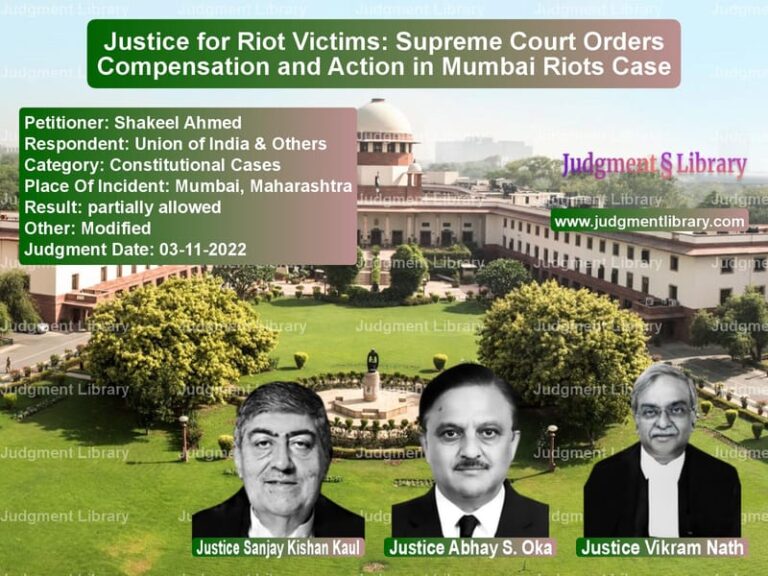NDPS Act Conviction Restored: Supreme Court Reverses High Court Acquittal in Himachal Pradesh Drug Case
The Supreme Court of India recently delivered a crucial verdict in the case of The State of Himachal Pradesh vs. Pardeep Kumar & Others. This case revolved around the application of the Narcotic Drugs and Psychotropic Substances (NDPS) Act, 1985, and the legal validity of the prosecution’s evidence in securing convictions for drug-related offenses. The Court reinstated the trial court’s conviction, overturning the High Court’s acquittal of the accused under Sections 20 and 29 of the NDPS Act.
The significance of this ruling lies in its emphasis on legal scrutiny in narcotics cases, the burden of proof required for conviction, and the judiciary’s stance on procedural errors affecting prosecution cases. This case also serves as a precedent for future trials under the NDPS Act, reinforcing the importance of evidentiary integrity in criminal proceedings.
Background of the Case
On January 27, 2009, around 6:30 p.m., a police patrol intercepted a white Indica car on National Highway 21 along the Manali-Kullu road. Upon stopping the vehicle, the police noticed one individual fleeing, while two others—accused No.1 and accused No.2—remained inside. Upon interrogation, the accused identified the fleeing individual as Rajbir Singh.
The police, after attempting to secure local witnesses without success due to extreme cold weather, proceeded to search the vehicle. They discovered a rucksack near accused No.2, containing a cannabis mixture weighing approximately 18.85 kg. Samples of 25 grams each were taken from the contraband for forensic testing. The accused were arrested, and during interrogation, they claimed they had purchased the contraband from one Jeewan Lal (accused No.4). The police later arrested him and recovered an electronic weighing machine, cannabis residue, and related materials from his home.
Trial Court’s Verdict
The trial court convicted accused No.1 and accused No.2 under Sections 20 and 29 of the NDPS Act. The court sentenced them to 12 years of rigorous imprisonment and imposed a fine of Rs. 1,50,000 each. Failure to pay the fine would result in an additional one-year imprisonment. However, accused No.3 and accused No.4 were acquitted due to insufficient evidence against them.
Appeal Before the High Court
The accused challenged their conviction before the High Court, which reversed the trial court’s decision on the following grounds:
- The prosecution failed to produce independent witnesses despite the presence of a marketplace 100 meters from the spot of seizure.
- The recovered contraband was presented in a torn condition before the trial court, raising doubts about its integrity and authenticity.
Supreme Court’s Review of the Case
The Supreme Court examined the High Court’s rationale and found that the reasons for acquittal were not sufficient to overturn the trial court’s findings. The Court made the following observations:
On the Absence of Independent Witnesses
The Court noted:
“Examination of independent witnesses is not an indispensable requirement, and such non-examination is not necessarily fatal to the prosecution case. In the present case, independent witnesses were not available due to extreme cold.”
The Supreme Court held that the police’s failure to secure independent witnesses did not invalidate the prosecution’s case, particularly since the seizure took place on a highway at night in unfavorable weather conditions.
On the Condition of the Seized Contraband
The Supreme Court rejected the High Court’s claim that the torn packaging of the contraband rendered the evidence unreliable. The Court observed:
“The contraband was in a torn condition due to its bulky nature and the nails on the stool on which it was kept. The forensic samples were taken months before the presentation of the evidence, and no suggestion was made to prosecution witnesses that the package had been tampered with.”
The Court emphasized that forensic evidence, which confirmed the presence of cannabis, remained uncontested. Additionally, no defense argument was presented questioning the integrity of the sample tested by the forensic expert.
Supreme Court’s Final Judgment
Based on the above findings, the Supreme Court overturned the High Court’s acquittal and restored the trial court’s conviction. The Court ruled:
“We, therefore, for the aforementioned reasons, set aside the order of the High Court acquitting the accused-respondents and restore the order of the learned trial court convicting the accused-respondents under Section 20 read with Section 29 of the Narcotic Drugs and Psychotropic Substances Act, 1985. The sentence imposed by the learned trial Court is also restored.”
The Court further directed the accused to surrender immediately to serve the remaining portion of their sentence. Failure to do so would result in their being taken into custody.
Key Takeaways from the Judgment
This landmark ruling has several important implications:
- Strict Enforcement of NDPS Act: The ruling reinforces the importance of stringent enforcement in narcotics cases.
- Independent Witnesses Not Mandatory: The judgment clarifies that while independent witnesses add credibility, their absence does not automatically nullify a case.
- Forensic Evidence Holds Supreme Value: Courts will rely on properly collected and tested forensic evidence, even if physical packaging is compromised.
- Reaffirmation of Trial Court’s Discretion: The judgment upholds the role of trial courts in assessing credibility, unless serious procedural violations are evident.
Conclusion
The Supreme Court’s decision in The State of Himachal Pradesh vs. Pardeep Kumar & Others is a significant ruling in the realm of narcotics law enforcement in India. It ensures that procedural lapses, such as failure to secure independent witnesses or minor physical damage to evidence, do not automatically result in acquittals in serious drug offenses. The ruling upholds the principle that evidence integrity and due diligence in forensic processes are paramount in securing convictions under the NDPS Act.
By reinstating the trial court’s conviction and sentence, the Supreme Court has sent a clear message regarding the judicial system’s approach to drug-related crimes—ensuring that legal technicalities do not override the objective of justice and law enforcement.
Petitioner Name: The State of Himachal PradeshRespondent Name: Pardeep Kumar & OthersJudgment By: Justice Ranjan Gogoi, Justice R. BanumathiJudgment Date: 16-02-2018
Don’t miss out on the full details! Download the complete judgment in PDF format below and gain valuable insights instantly!
Download Judgment: The State of Himacha vs Pardeep Kumar & Othe Supreme Court of India Judgment Dated 16-02-2018.pdf
Direct Downlaod Judgment: Direct downlaod this Judgment
See all petitions in Drug Possession Cases
See all petitions in Judgment by Ranjan Gogoi
See all petitions in Judgment by R. Banumathi
See all petitions in allowed
See all petitions in supreme court of India judgments February 2018
See all petitions in 2018 judgments
See all posts in Criminal Cases Category
See all allowed petitions in Criminal Cases Category
See all Dismissed petitions in Criminal Cases Category
See all partially allowed petitions in Criminal Cases Category







